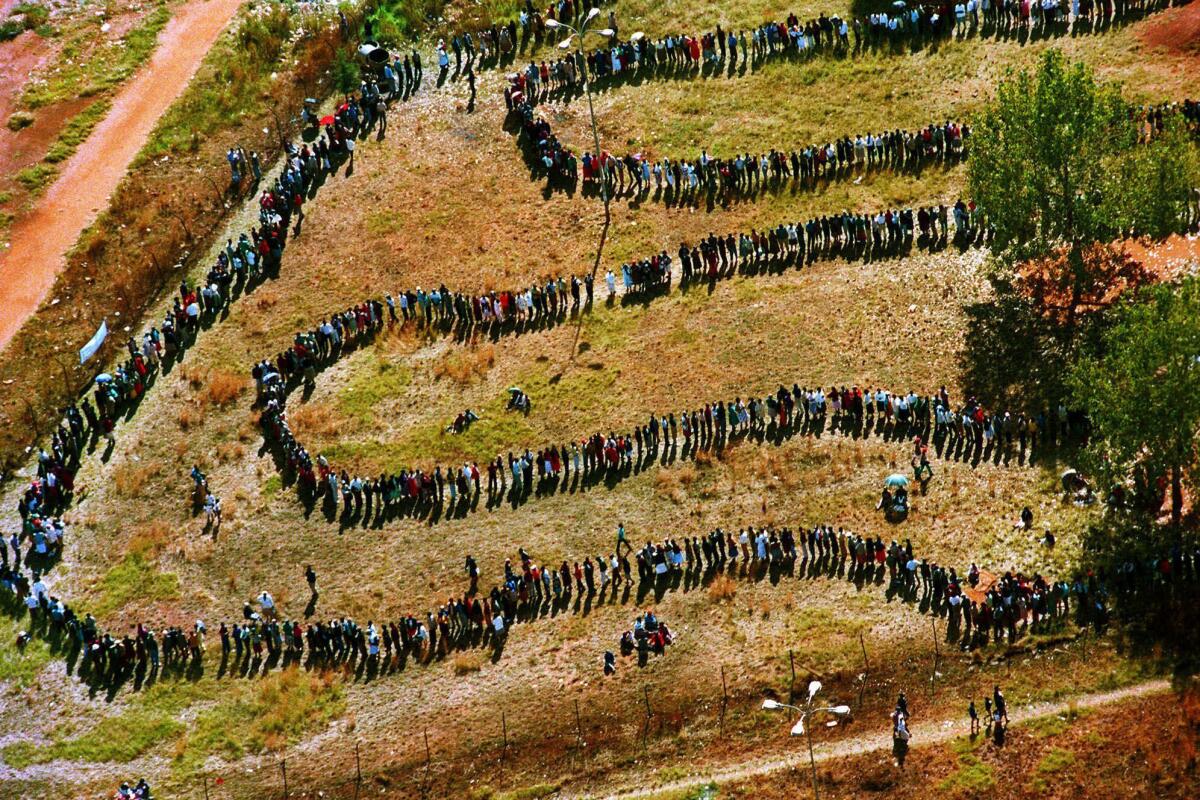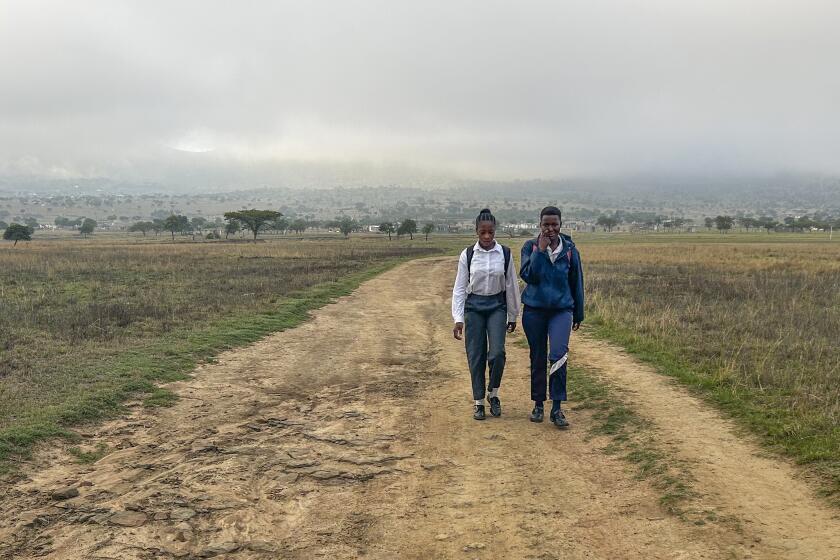South Africa marks ‘Freedom Day,’ 30 years since apartheid ended, amid discontent with the ANC

- Share via
CAPE TOWN, South Africa — South Africans celebrated their “Freedom Day” on Saturday, commemorating their country’s pivotal first democratic election on April 27, 1994, that announced the official end of the racial segregation and oppression of apartheid.
South Africa marked the 30th anniversary with 21-gun salutes and remembrances of that momentous vote, when millions of Black South Africans decided their own futures for the first time, a fundamental right they had been denied by a racist white minority government.
The first all-race election saw the previously banned African National Congress party win overwhelmingly and made its leader, Nelson Mandela, the country’s first Black president four years after he was released after decades in prison.
But Saturday’s celebrations of the momentous anniversary were set against a growing discontent with the current government.
Nelson Mandela, who emerged from more than a quarter of a century in prison to steer a troubled African nation to its first multiracial democracy, uniting the country by reaching out to fearful whites and becoming a revered symbol of racial reconciliation around the world, died Thursday.
Here’s what you need to know about that iconic moment and a South Africa that’s changing again 30 years on:
A turning point
The 1994 election was the culmination of a process that began four years earlier when F.W. de Klerk, the last apartheid-era president, shocked the world and his country by announcing that the ANC and other anti-apartheid parties would be unbanned.
Mandela, the face of the anti-apartheid movement, was released from prison nine days later, setting him on the road to becoming South Africa’s first Black leader.
South Africa needed years to prepare and was still on a knife-edge in the months and weeks before the election because of ongoing political violence, but the vote — held over four days between April 26 and April 29 to accommodate the large numbers who turned out — went ahead successfully.
A country that had been shunned and sanctioned by the international community for decades because of apartheid emerged as a full-fledged democracy.

Heroes
Nearly 20 million South Africans of all races voted, compared with just 3 million white people in the last general election under apartheid in 1989.
Associated Press photographer Denis Farrell’s iconic aerial photograph of people waiting patiently for hours in long, snaking queues in fields next to a school in the famed Johannesburg township of Soweto captured the determination of millions of Black South Africans to finally be counted. It was nominated for a Pulitzer Prize.
“South Africa’s heroes are legend across the generations,” Mandela said as he proclaimed victory. “But it is you, the people, who are our true heroes.”
Apartheid falls
The ANC’s election victory ensured that apartheid was finally dismantled and a new constitution was drawn up and became South Africa’s highest law, guaranteeing equality for everyone no matter their race, religion or sexuality.
Apartheid, which began in 1948 and lasted for nearly half a century, had oppressed Black and other nonwhite people through a series of race-based laws. Not only did the laws deny them a vote, they controlled where Black people lived, where they were allowed to go on any given day, what jobs they were allowed to hold and whom they were allowed to marry.
30 years on
Current South African President Cyril Ramaphosa — a protege of Mandela — presided over the celebrations at the Union Buildings in Pretoria, the seat of government.
“Few days in the life of our nation can compare to that day, when freedom was born,” Ramaphosa said in a speech. “South Africa changed forever. It signaled a new chapter in the history of our nation, a moment that resonated across Africa and across the world.”
“On that day, the dignity of all the people of South Africa was restored,” Ramaphosa said.
The ANC has been in government ever since 1994 and while it is still recognized for its central role in freeing South Africans, it is no longer celebrated in the same way as it was in the hope-filled aftermath of that election.
South Africa in 2024 has deep socioeconomic problems, with severe poverty that still overwhelmingly affects the Black majority. The official unemployment rate is 32%, the highest in the world; it’s more than 60% for people ages 15-24.
Thousands of kids in South Africa’s poorest, most remote rural areas still face a miles-long walk to school nearly 30 years after democratic change.
Millions of Black South Africans still live in neglected, impoverished townships and informal settlements on the fringes of cities in what many see as a betrayal of the heroes Mandela referred to. South Africa is still rated as one of the most unequal countries in the world.
The ANC is now largely being blamed for the lack of progress, even if the damage of decades of apartheid wasn’t going to be easy to undo.
Another pivotal election?
The 30th anniversary of 1994 fell with another possibly pivotal election as a backdrop. South Africa will hold its seventh national vote since the end of apartheid on May 29.
Analysts and polls predict that the ANC will lose its parliamentary majority for the first time as a new generation of South Africans make their voices heard. The ANC will likely have to enter into complicated coalitions with smaller parties to remain part of the government.
South Africans still cherish the memory of Mandela and the elusive freedom and prosperity he spoke about in 1994. But the majority of them now appear ready to look beyond the ANC to attain it.
Imray writes for the Associated Press.
More to Read
Sign up for Essential California
The most important California stories and recommendations in your inbox every morning.
You may occasionally receive promotional content from the Los Angeles Times.











